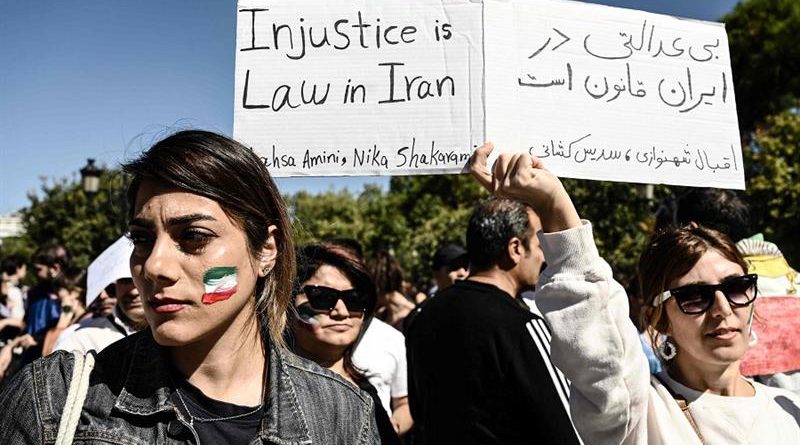OPINION: Iran Protests—The View from Egypt
by Dalia Ziada
In the long term, the fall of the Iranian regime could be a relief for the Egyptian state, as well as most Middle East countries.
The Egyptian people and leadership are watching the popular uprising in Iran with a sense of hope and dread. The hope is embedded in the potential of ridding the Middle East of the Iran-sponsored proxies and militias that have been wreaking havoc all over the region for decades.The fear, however, stems from the predictable political and security chaos that may result from the inevitable collapse of the Islamic Republic in Iran, under the pressure of the ongoing highly disciplined protests that are growing in size and effect every day.
Iran exploited the power vacuums created by the Arab Spring revolutions, in 2010-2011, to infiltrate the security structures of countries with critical geo-strategic locations around the Arabian Peninsula. Iran empowered Shiite armed groups in Yemen and equipped them with missiles and UAV drones to attack civilian homes and economic facilities in Saudi Arabia and other Gulf countries. That renewed the Arab armament race that reached a peak point in the past five years.
In addition, Iran sponsored Shiite militias in Syria and Iraq to fight the Kurds inhabiting the northern territories of the levant, control the decision-making process in these countries, and even hinder the Turkish military operations against terrorist groups there. Needless to mention Iran’s decades-long political and military sponsorship of Hezbollah in Lebanon. Hezbollah, established on the premise of fighting Israel, contributed a big deal to destroying Lebanon from within. Hezbollah dragged Lebanon to a geopolitical conflict that is way bigger than its size and capabilities. It, also, played a clear role in enlarging the existing political and economic miseries of the Lebanese people, to serve the interests of Iran.
Ironically, Hezbollah used to be highly respected by many Egyptians, especially on the back of its brief war with Israel, in 2006. I still remember scenes of the Egyptian media proudly celebrating Hassan Nasrallah, the founding leader of Hezbollah, as an Arab and Islamic hero. This changed a couple of years later when the mask of ‘fighting Israel’ fell off, and the public saw the true face of Nasrallah and his group.
The same media outlets fried Mohammed Morsi, the Muslim Brotherhood leader who became the president of Egypt following the fall of Mubarak, on the background of traveling to Tehran and meeting with his Iranian counterpart. After the fall of the Muslim Brotherhood regime, in 2013, Morsi was taken to an espionage trial and charged with “passing state secrets to Iran’s Revolutionary Guard.”
In the past year, news has been circulating about secret talks between the Iranian and the Egyptian leaderships that may pave the way for reconciliation. The Baghdad Summit in August 2021, which brought Arab, Turkish, and Persian leaders into the same room for the first time since the 1980s, heightened the speculations about a potential rapprochement between Iran, Egypt, Saudi Arabia, and other Arab countries. But the Negev summit, held in March of this year, killed such buzzes as the leaders of Israel, Egypt, UAE, Morocco, and Bahrain held hands to send a clear message of Arab-Israel solidarity against the regional provocations of Iran.
The current Egyptian state believes in the viability of ‘working with the devil that you know.’ While the Iranian top diplomates told the media that the talks with Egypt have been promising, the Egyptian side indirectly hinted that the discussions are only limited to security considerations. Egypt is justifiably concerned that its growing relationship with Israel may inflame an Iranian offensive on Israeli targets in Egypt, specifically the natural gas facilities that the two neighbors operate in the eastern Mediterranean.
In the long term, the fall of the Iranian regime could be a relief for the Egyptian state, as well as most Middle East countries. But this comes with a price that has to be paid in advance. The collapse of the Mullah regime will eventually contribute to the disappearance of armed militias and proxies and allow a healthy space for restoring relationships between the Arabs, the Turks, and Israel. In the meantime, a power vacuum in Iran will expose the eastern gates of the Arab Gulf region to distressing security threats that will ultimately echo in the Egyptian domestic economy and political stability.
Such a development will intensify Egypt’s economic and security uncertainties. Therefore, it is wise for the Egyptian state to prepare itself for the worst-case scenario while watching the developments in Iran.
Article first published in Sada El-Bilad.
Disclaimer: Views expressed by writers in this section are their own and do not reflect Milli Chronicle’s point-of-view.



